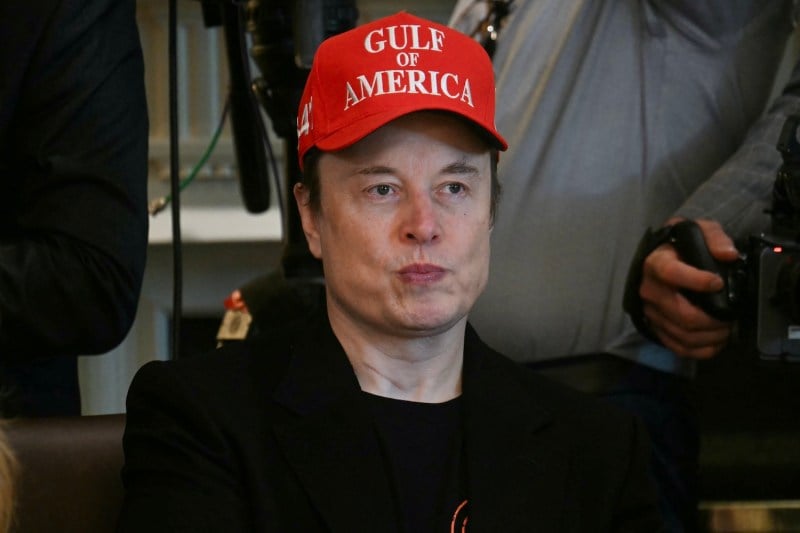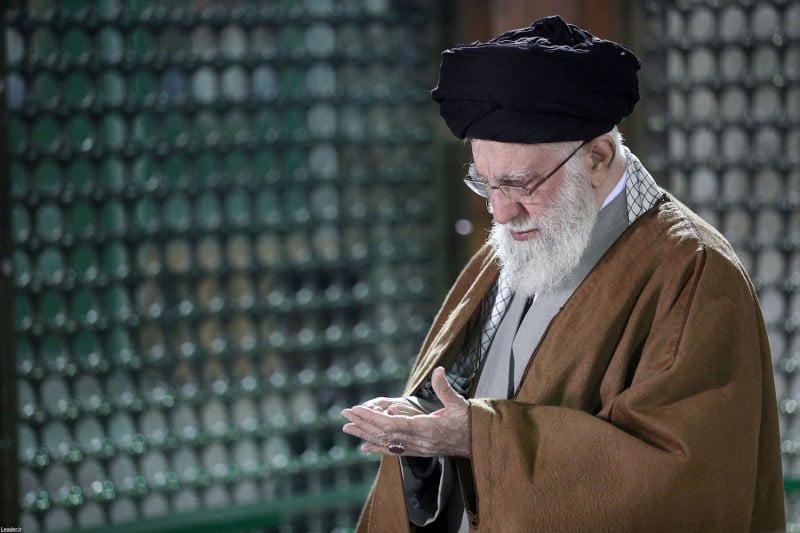Elon Musk Was Donald Trump’s Useful Idiot

Elon Musk Was Donald Trump’s Useful Idiot
It’s looking increasingly likely that the world’s richest man got played.
Elon Musk looks on at a cabinet meeting in the White House in Washington on April 30. Jim Watson/AFP via Getty Images
What did Elon Musk actually hope to achieve at the Department of Government Efficiency (DOGE)?
Late last month, a chastened-looking Musk admitted that DOGE has been “not as effective as I’d like.” The quasi-agency claims that it has so far saved the U.S. government $170 billion, mostly by firing employees, repealing regulations, and canceling contracts and grants. But it hasn’t provided evidence for—or has greatly exaggerated—most of these savings. In reality, DOGE’s slapdash approach to slashing government will, by one estimate, cost taxpayers an additional $135 billion this year. And actual federal spending has been rising since President Donald Trump took office.
What did Elon Musk actually hope to achieve at the Department of Government Efficiency (DOGE)?
Late last month, a chastened-looking Musk admitted that DOGE has been “not as effective as I’d like.” The quasi-agency claims that it has so far saved the U.S. government $170 billion, mostly by firing employees, repealing regulations, and canceling contracts and grants. But it hasn’t provided evidence for—or has greatly exaggerated—most of these savings. In reality, DOGE’s slapdash approach to slashing government will, by one estimate, cost taxpayers an additional $135 billion this year. And actual federal spending has been rising since President Donald Trump took office.
As Musk now pares back his government work to focus on his companies, particularly the troubled Tesla, the questions that dogged his turbulent tenure continue to swirl. Did he really believe he could slice $1 trillion out of the federal budget, or was he just trying to use his insider position to win contracts, gain intel on competitors, and shoulder pesky regulators out of his companies’ way? Was he hoping to use artificial intelligence to revolutionize government processes or merely to purge “wokeness”? Was his real aim with DOGE to create a superpowered surveillance state by consolidating government data across dozens of agencies?
All of the above can be true at once. But the abject failure of DOGE as a cost-cutting exercise is starting to make Musk look like a tool for other people’s agendas—in particular, Russell Vought, director of the Office of Management and Budget (OMB), one of the most powerful behind-the-throne positions in the Trump administration.
To understand what Musk thought he was doing at DOGE, it helps to consult his biographies.
Although Walter Isaacson’s 2023 Elon Musk is often criticized as hagiographic, he remains the only one of Musk’s biographers who has spent serious time with the man. Isaacson, a former chairman of CNN and editor of Time, relates that by his mid-20s, Musk had developed a “life vision” based around three things that he believed would be critical for humanity: the internet, because of its disruptive potential; sustainable energy, because of climate change; and space travel, because he believed the human race must colonize other planets to ensure its own survival.
Elon Musk, Walter Isaacson, Simon & Schuster, 688 pp., $35, September 2023; Hubris Maximus, Faiz Siddiqui, St. Martin’s Press, 336 pp., $30, April 2025; Character Limit, Kate Conger and Ryan Mac, Penguin Press, 480 pp., $32, September 2024
Reid Hoffman, who worked with Musk at PayPal before going on to co-found LinkedIn, told Isaacson that “Elon starts with a vision and later finds a way to backfill in order to make it work financially.” Another PayPal colleague, Max Levchin, added: “One of Elon’s greatest skills is the ability to pass off his vision as a mandate from heaven.”
Tesla was Musk’s way of tackling climate change; SpaceX his route to Mars. Driven by his sense of holy purpose, Musk saw government regulators, with their petty concerns about safety or environmental impacts, as nothing less than obstacles to human survival.
An illustration of this appears in Washington Post reporter Faiz Siddiqui’s new book, Hubris Maximus: The Shattering of Elon Musk. Siddiqui—who, unlike Isaacson, had no access to Musk—describes how the Tesla CEO clashed repeatedly with officials at the National Highway Traffic Safety Administration and its cousin, the National Transportation Safety Board, as they investigated fatal crashes involving Teslas on Autopilot, the car’s partial self-driving mode, starting in 2016.
One of Tesla’s talking points, Siddiqui writes, was that on highways, Autopilot “was safer than normal driving when crash data was compared.” At a company event in 2022, Musk said, “At the point of which you believe that adding autonomy reduces injury and death, I think you have a moral obligation to deploy it.” By this logic, regulators who tried to slow Autopilot adoption were killing people.
To his antipathy to bureaucrats and rules, add Musk’s “slash first, fix later” approach to cost-cutting, his general disdain for planning, and his unshakable belief that he is always right—traits ably documented by New York Times journalists Kate Conger and Ryan Mac in their 2024 book, Character Limit: How Elon Musk Destroyed Twitter. Musk had cut the workforce at Twitter, now X, by four-fifths, and while the platform went through rough patches at first, it didn’t collapse. Why couldn’t the same approach work for the federal government?
So when Musk and the equally impulsive and self-confident Trump came up with the idea for DOGE last summer, it’s hard to believe they had a well-thought-out plan. But one man—Vought—undoubtedly saw how a quasi-agency led by an attention-seeking clown might help advance his own aims while keeping them in the shadows.
Vought, a self-described Christian nationalist, was one of the masterminds of Project 2025, the far-right reform plan so toxic that Trump disavowed it on the campaign trail, before appointing Vought to the OMB to effectively execute it.
In a speech two years ago, Vought said, “We want the bureaucrats to be traumatically affected. When they wake up in the morning, we want them to not want to go to work.” His overarching goal was to weaken federal agencies that he saw as a “deep state” overrun with obstructionist lefties and to put more power in the hands of the president.
Details of the relationship between Musk and Vought emerged last month in a report by Bloomberg journalist Max Chafkin, who wrote that Musk was “in regular contact with Vought” after the election and was “seen by Vought’s allies as the public-facing arm of his agenda” and by Vought himself as a “force multiplier.”
We don’t know to what extent Musk’s methods at DOGE—such as firing probationary federal workers (those with the fewest labor protections) and seizing control of federal data systems—were his own invention versus Vought’s. Perhaps the OMB director simply recognized that nobody could match Musk’s forcefulness and encouraged him to bring the same blitzkrieg mentality to government that he had used with his companies.
Convinced as he was that the government was a cesspool of waste and fraud, Musk may well have truly believed that he could trim it just by firing as many people as possible and giving a bunch of young loyalists AI tools and access to data. (In fact, it should be possible to cut a huge amount of government spending, but mostly by ending what are essentially subsidies to industries including defense, finance, and health care—something that would require major policy changes, not just some streamlining of government operations.)
Musk may also believe that any conflicts of interest he has are irrelevant: After all, if his business ventures are all in the service of humanity, isn’t it good for humanity if they get more government contracts?
But in the process, Musk certainly achieved Vought’s aim of traumatizing bureaucrats. And the consolidation of all government data, which continues apace even as Musk steps back, could now be used by the White House to target political opponents or undocumented immigrants, as well as recalcitrant government workers.
It seems obvious in retrospect that tighter control of the federal bureaucracy—always Vought’s stated goal—was the real purpose of DOGE, and the cost-cutting was secondary. By hogging the limelight with his antics and making it seem like it was all about “government efficiency” (who, after all, doesn’t want that?), Musk served to distract from that purpose, as well as to divert criticism away from Trump.
Musk’s term at DOGE seems to be winding down sooner than he, Vought, or Trump anticipated. Clashing with the president on tariffs, alienating members of the cabinet, and failing to swing a state judicial race despite pouring $25 million into it may have made Musk something of a liability. His deep pockets will ensure he always retains a certain usefulness to the Trump White House, and his companies will no doubt continue to benefit from lucrative contracts. But based on the last few months, it’s hard not to conclude that he got played.
Books are independently selected by FP editors. FP earns an affiliate commission on anything purchased through links to Amazon.com on this page.
This post is part of FP’s ongoing coverage of the Trump administration. Follow along here.
Gideon Lichfield is the former editor-in-chief of WIRED. He writes Futurepolis, a newsletter about the future of democratic governance. Bluesky: @glichfield.bsky.social X: @glichfield
More from Foreign Policy
-

Indian Air Force personnel stand in front of a Rafale fighter jet during a military aviation exhibition at the Yelahanka Air Force Station in Bengaluru. A Tale of Four Fighter Jets
The aircraft India and Pakistan use to strike each other tell a story of key geopolitical shifts.
-

A cardinal in a black robe with red sash with hands folded in front of him walks past a stage and steps. Conclave Sends Message With American Pope
Some cardinals had been agitating for U.S. leadership to counter Trump.
-

An illustration shows red tape lines crossing over and entrapping a semiconductor chip. Is It Too Late to Slow China’s AI Development?
The U.S. has been trying to keep its technological lead through export restrictions, but China is closing the gap.
-

A man watches a news program about Chinese military drills surrounding Taiwan, on a giant screen outside a shopping mall in Beijing on Oct. 14, 2024. The Pentagon Fixates on War Over Taiwan
While U.S. military leaders fret about China, Trump has dismissed the Asia-Pacific.









Join the Conversation
Commenting on this and other recent articles is just one benefit of a Foreign Policy subscription.
Already a subscriber?
.
Subscribe
Subscribe
View Comments
Join the Conversation
Join the conversation on this and other recent Foreign Policy articles when you subscribe now.
Subscribe
Subscribe
Not your account?
View Comments
Join the Conversation
Please follow our comment guidelines, stay on topic, and be civil, courteous, and respectful of others’ beliefs.
Change your username |
Log out
Change your username:
CANCEL
Confirm your username to get started.
The default username below has been generated using the first name and last initial on your FP subscriber account. Usernames may be updated at any time and must not contain inappropriate or offensive language.